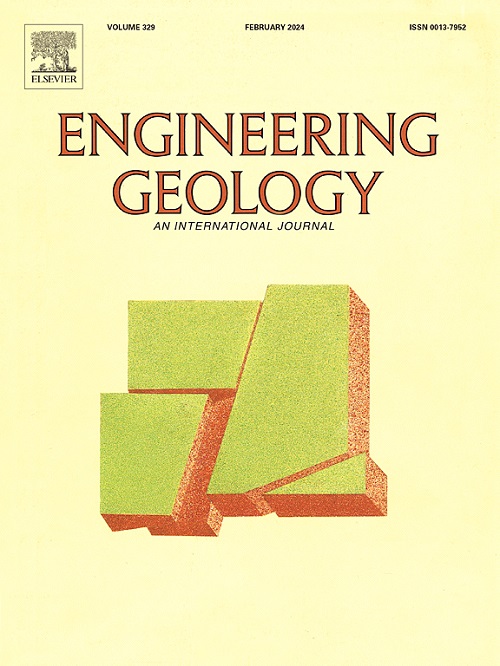Bayesian identification of the optimal soil-water characteristic curve (SWCC) model and reliability analysis of unsaturated loess slope from extremely sparse measurements
IF 6.9
1区 工程技术
Q1 ENGINEERING, GEOLOGICAL
引用次数: 0
Abstract
Soil-water characteristic curve (SWCCs) are crucial in engineering geology and geotechnical engineering for understanding the behavior of unsaturated soils, such as loess, which directly affects permeability, shear strength, and volume change-key factors in slope stability and soil-structure interactions. Conventionally, SWCC estimation relies on multiple (saying approximately ten) measurements fitted to parameterized models. However, in practical applications, especially for medium- or small-scale projects, the availability of SWCC measurements is often extremely limited (e.g., one or two measurements) due to the time-intensive nature of the experiments. This presents significant challenges in accurately identifying suitable SWCC models and performing reliable stability analyses for unsaturated soil slopes. To address these challenges, this study employs a hierarchical Bayesian framework that integrates information from similar geotechnical site, enabling robust SWCC estimation and model selection from minimal measurements with the aid of Markov Chain Monte Carlo (MCMC) sampling, thereby quantifying model uncertainties and providing more scientifically informed decision-making for construction in engineering geology. MCMC samples obtained further facilitate both the identification of the most suitable SWCC model and the quantification of associated uncertainties. Then, a reliability-based stability analysis of an unsaturated loess slope is conducted, using the optimal SWCC model and its quantified uncertainty. The proposed methodology is validated through a real-world case study, demonstrating its effectiveness in deriving reliable SWCC models and performing stability analyses under conditions of extremely sparse data. The results highlight the potential of this method as a practical tool for advancing reliability assessments of unsaturated soil slopes in engineering geology.
基于极稀疏测量的非饱和黄土边坡最佳土水特征曲线(SWCC)模型贝叶斯识别及可靠度分析
土-水特征曲线(swcc)在工程地质和岩土工程中具有重要意义,可用于了解非饱和土(如黄土)的行为,它直接影响渗透、抗剪强度和体积变化——边坡稳定性和土-结构相互作用的关键因素。通常,SWCC估计依赖于多个(大约10个)参数化模型的测量值。然而,在实际应用中,特别是在中小型项目中,由于实验的时间密集性,SWCC测量的可用性通常非常有限(例如,一次或两次测量)。这对准确识别合适的SWCC模型和对非饱和土边坡进行可靠的稳定性分析提出了重大挑战。为了应对这些挑战,本研究采用了一个分层贝叶斯框架,该框架集成了来自类似岩土场地的信息,借助马尔可夫链蒙特卡罗(MCMC)采样,实现了稳健的SWCC估计和最小测量的模型选择,从而量化了模型的不确定性,并为工程地质施工提供了更科学的决策。获得的MCMC样品进一步促进了最合适SWCC模型的识别和相关不确定性的量化。然后,利用最优SWCC模型及其量化不确定性,对某非饱和黄土边坡进行了基于可靠度的稳定性分析。通过实际案例研究验证了所提出的方法,证明了其在导出可靠的SWCC模型和在极稀疏数据条件下执行稳定性分析方面的有效性。结果表明,该方法具有提高非饱和土边坡工程地质可靠性评估的实用工具的潜力。
本文章由计算机程序翻译,如有差异,请以英文原文为准。
求助全文
约1分钟内获得全文
求助全文
来源期刊

Engineering Geology
地学-地球科学综合
CiteScore
13.70
自引率
12.20%
发文量
327
审稿时长
5.6 months
期刊介绍:
Engineering Geology, an international interdisciplinary journal, serves as a bridge between earth sciences and engineering, focusing on geological and geotechnical engineering. It welcomes studies with relevance to engineering, environmental concerns, and safety, catering to engineering geologists with backgrounds in geology or civil/mining engineering. Topics include applied geomorphology, structural geology, geophysics, geochemistry, environmental geology, hydrogeology, land use planning, natural hazards, remote sensing, soil and rock mechanics, and applied geotechnical engineering. The journal provides a platform for research at the intersection of geology and engineering disciplines.
 求助内容:
求助内容: 应助结果提醒方式:
应助结果提醒方式:


